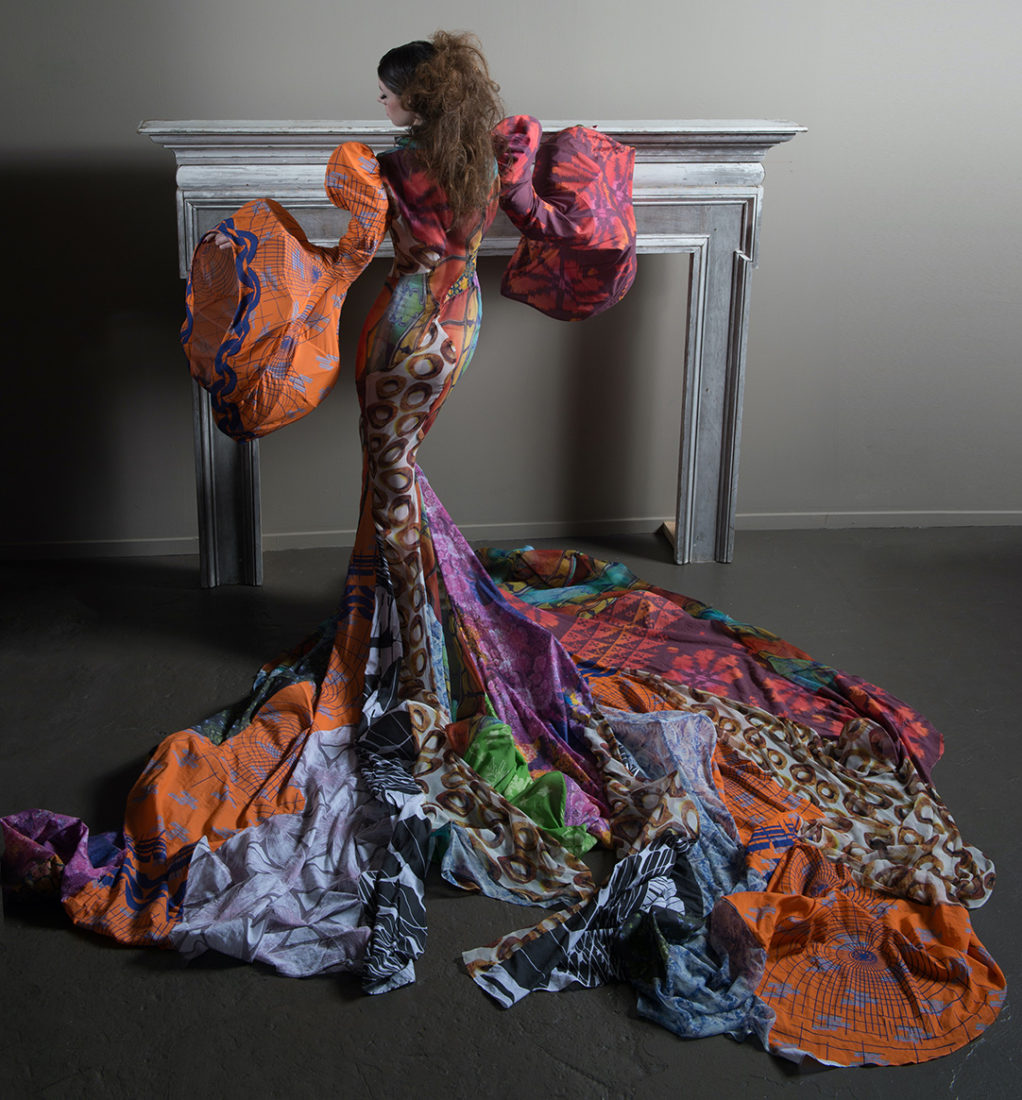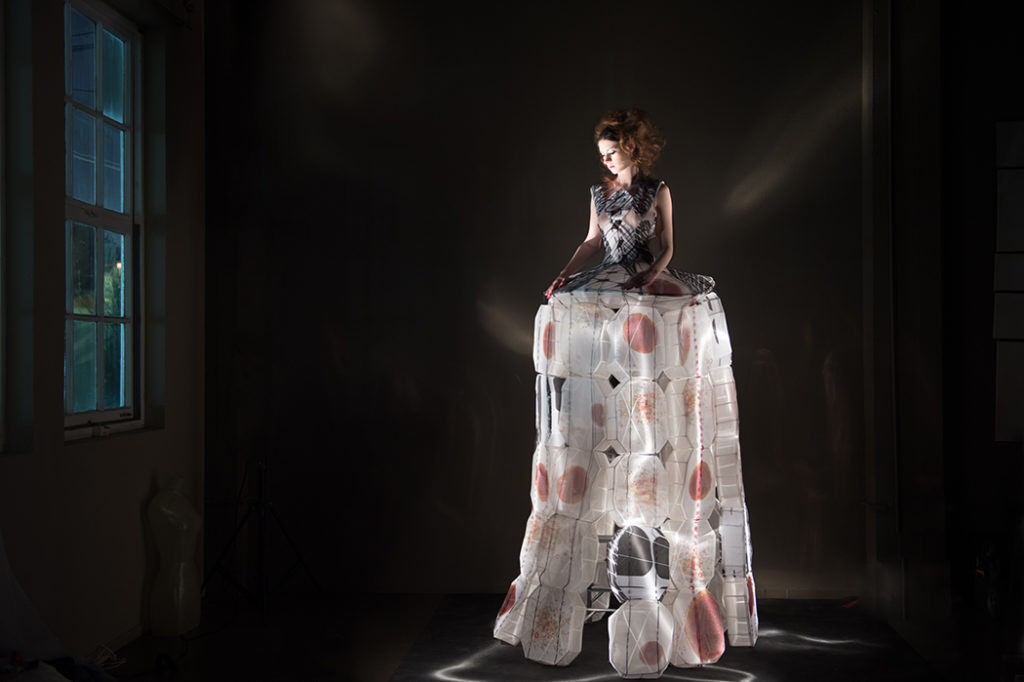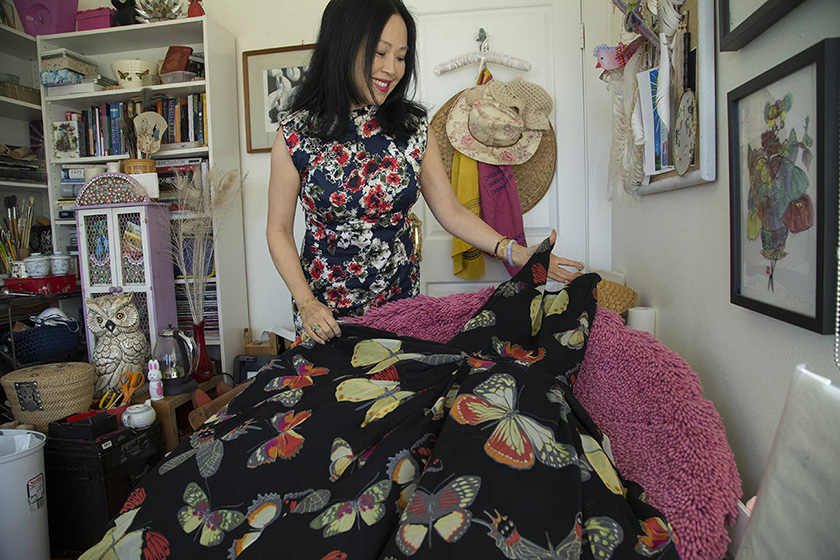All Access: Q&A with Colleen Quen
I had this interview with Colleen Quen for my first SF Examiner cover story. This week I spent some time perusing her looks and videos— from fashion shows at Hotel Fairmont San Francisco, to appearances on America’s Next Top Model, and also documentaries; I can see why she has been a darling of the San Francisco fashion scene, small as it is, for more than 20 years.
We spoke just on the phone but it all felt pretty intimate. She said a lot, so I condensed this considerably and highlighted some key takeaways.
Patreon-exclusive portion of interview unlocked below.
Tell me about yourself.
I think I lived like 10 lives already. I started my business in 1998, but actually went to FIDM in 1986. I am 58 years old, and I’ve been doing this ever since I was 20. I began working for many different companies for 10 years in mass production. I studied with a French woman, Simmin (pronounced “Simone”) Sethna— she taught here, but had her degree in Haute Couture in Paris, in evening wear. She came here in the U.S., and I studied with her for a good few years, got my certificate.
I’m colleagues with Lily Samii, both with our own businesses with clients who would go to both of us for ballet, symphony, and opera openings. I was doing that for 20 years, but then I had breast cancer. I closed my atelier space and rested for five years. During that time, I just started painting. Chinese watercolors— I studied with master painter Madeline Fu for five years. During that time, of course, I was very into Chi Gong, a beautiful way of preserving life and health.
In the first year that I stopped designing, I thought, “Oh my God, I’m going crazy.” Everything I saw in the world, I saw through the lens of fashion. I’m known for my butterflies and flowers, and I’m all about nature. So I incorporated all of that into my painting. I painted 350 paintings in a year. It was really healing for me. Then I said I’m going to have an art show and had my first one. So many came— like 200 people attended my art show.
Do you still design fashion, and who for?
I do create evening gowns but only by commission. I design costumes for Alonzo King LINES Ballet— I’ve been creating for him since 2002.
I specialize in evening wear, with my designs on Patricia Sprincin, Sallie Huntting, Norah Stone, and all the wonderful philanthropist people for the San Francisco Opera Guild, the symphony, ballet, and the Asian Art Museum.

It sounds like a lot! Are you able to make a living on it?
It’s hard for me actually, I have to say.
I have a teacher’s artists salary. It’s not something that I boast about, but it’s also the trade-off for my freedom, and I’d rather live my life with freedom. Teaching actually provides me my living expenses. But I’m not a luxurious person. I think I have enough possessions, my place has everything I need. I don’t need more possessions, I crave my possessions. I don’t need any more stuff. I have so much stuff, I want to be sustainable. I want to use my money wisely. My money goes there. That’s my investment. I don’t need to buy stuff for myself anymore.
How is teaching in the pandemic?
It’s all video teaching. In French couture, I can do everything in one fit, and it’s really hard for me to see everything that I need to see on an iPad. I can’t see all the details, and it’s kind of like this one way of speaking— the camera cannot zoom in, and my work is so precise. I really need them here [in my studio].
But also, I am grateful that my students are getting their private time with me and maybe a little bit more. This situation is all about humanity and what’s happening to us, and what’s been happening to them. I teach my students to be their own businesspeople, so that they can make their own creations and be entrepreneurs, too. Lots of my students have their own business; They’re not working for a big company. My students are exactly like me. They’re like my children that I’m raising. I’ve never had children.

As a Chinese-American woman, how has the violence in Atlanta and Stop Asian Hate movement affected you?
I was so upset about that. My roots have been in the San Francisco Bay Area for 150 years, and it’s like we are going reverse or something.
I want to belong here— I don’t want to feel like a foreigner. I think SF is much more diverse here. But I do feel I’m still in fear for my life. My friends tell me, “You need to carry something [for defense] just in case Colleen, you can’t just walk around with your French Bulldog.” I’m so paranoid, I have to think about these things. I feel like I have to dress like a Chinese Bruce Lee. At the same time, I just want to be me, to wear my cute little Qipao but don’t want to be seen and told, “Oh you’re a China virus.”
Patreon-exclusive interview continues here.
I am just sad right now. Anyone who is hurting people, I see that and think that’s like my grandma, don’t hurt them. Asian people are just like family. I just love everyone.
If I’m in some big organization, I’m usually the only Asian. I know that my voice sometimes can be secondary. But then I’m used to that, I don’t demand anything more than that. I usually just settle, the way I was raised was to be humble. I’l settle because I’m super grateful.
I’m not only a minority but also a woman— All these stereotypes. I’m not passive though: I actually am a [Chinese zodiac] Tiger, so I do speak up when I need to. At the same time, I don’t want to disturb anyone. It’s this integrity, like a family pride. I don’t want to disturb my family pride [by speaking up]. If I was a different nationality, it might be different. But I settle for it.
Tell me about your family.
I’m from San Francisco, I grew up in Alameda. I came from a family of engineers and doctors. They said something like, “Oh you’re going to be an artist, that’s going to be your career.” I think I’m the first one. I’m creating my own path, I didn’t have a role model. I didn’t have an Asian role model, I became my own just to do my own thing. I am 3rd generation, my grandparents were born here in the late 1800s— both of them were Chinese herb doctors. My father and uncles all went to UC Berkeley. Both my mother’s side and father’s side are very well educated. No one was artists.
Are they proud and supportive?
Oh yes. My father is almost my publicist, he’s 90 years old and still always like my publicist.
What else do you do?
I’m currently trying to make my living off of painting and teaching. I taught at FIDM and also California College of Arts, and now I’m painting and also doing commissions. I love creating fashion through music and sound— I play the guzheng, piano, and flute. I see things visually when I hear sound. I always like breaking boundaries.
Currently, I’m working on a collaboration with the New Century Chamber Orchestra— I’m listening to their beautiful music and their live performance, and I’m going to create something through it. I’m also a fashion journalist: I have done two PBS documentaries, one is on ethnic minorities, and collaborated on the other on the Qipao. Another person— this is his documentary that he’s invited me with another partner of mine, D3 Productions, and it’s an hourlong documentary.
I’m kind of coming full circle now, I’m painting and also doing commissions. I love creating fashion through music and sound— I also play music. I play the guzheng and also the piano and flute. I create through sound, I see things visually when I hear sound.
Have you made apparel in quarantine?
It’s a drastic change because of course— I didn’t have a lot of commissions because I couldn’t see anyone. I created 30 different types of masks in April 2020. There’s a ladybug, a heart, and a butterfly mask, to name a few. I was tired walking my dog and seeing everyone make that blue little surgical mask. But then I got bored and thought: I don’t want to be a mask designer. Financially, it was my teaching that supported me.

Leave a Reply